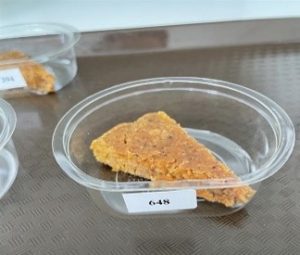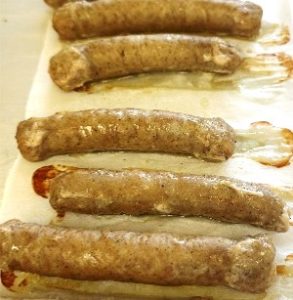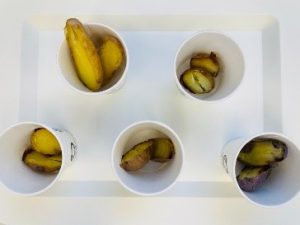CSMI’s New Food Technology Laboratory
VINELAND STATION, Ontario, May 28, 2025
This year, the Consumer, Sensory & Market Insights (CSMI) team added an additional food-grade laboratory to our facilities. This new research workspace, the Food Technology Lab, allows us to conduct additional activities in-house. These new capabilities include different cooking methods and ingredient preparation and processing activities like drying and milling.
Since its opening, CSMI researchers have put this new space to good use, launching several new projects this winter and spring.
What’s inside the Food Technology Lab?
In addition to larger and more spacious, food-safe work surfaces, several pieces of equipment for drying, cooking and milling were acquired for the Food Technology Lab space. The space includes lab-scale versions of equipment (Fig 1) used in industry to prepare and process food and ingredients, such as upcycled apple pomace powder
New Capabilities
The Food Technology Lab allows the CSMI team to conduct studies on cooked products and also preparation of value-added products, like ingredients produced from fruit and vegetable by-products.
Recently, the CSMI team collaborated with several partners, including Niagara College and Gum Products International, to develop food formulations for research studies using our new workspace. These formulations were prepared and presented to sensory panelists to assess and describe their sensory characteristics.
See the examples we’ve included of recent projects conducted with the new lab space.
Between February and March 2025, the CSMI team conducted taste evaluations of various formulations of plant-based patties, using fruit and vegetable by-product powders dried and milled in the Food Technology Lab. The patties were produced in partnership with Niagara College as part of a multi-year project.
Plant-based patties were cooked in the convection oven evaluated for overall difference and also specifically for texture differences (i.e. firmness, adhesiveness, granular texture) compared to a reference sample.
In March 2025, twenty-five members of the sensory panel and also Vineland staff were recruited to complete a paired preference tasting of pork breakfast sausages, containing onion peel powder prepared in the Food Technology Lab.
After cooking from frozen in the convection oven of the Food Technology Lab, 5 pairs of breakfast sausages were presented to each participant in the sensory lab booths. For each pair, participants selected the sausage that they preferred.
This spring we will be evaluating the sensory properties of baked potatoes as part of a preliminary research trial. Samples will be cooked using the convection oven in the Food Technology Lab and served to the trained sensory panel at a standardized temperature for tasting. Recently an orientation tasting was conducted with several varieties of mini potatoes to generate attributes that describe the aroma, flavour, taste and texture of the potatoes.
This new laboratory space and equipment expands our capabilities, expertise and ability to have impact in horticulture research and innovation.
Funding for the equipment purchases, plant-based patty project and breakfast sausage project was provided through AAFC Sustainable CAP Food Science Cluster managed by CIFST and OMAFA Ontario Agri-Food Research Initiative (OAFRI).
Questions? Looking for more information?
Contact: Dr. Amy Bowen, Director, Consumer, Sensory & Market Insights amy.bowen@vinelandresearch.com
About Vineland Research and Innovation Centre
Vineland is a uniquely Canadian, results-oriented organization dedicated to horticulture science and innovation. We deliver innovative products, solutions and services through an integrated and collaborative, cross-country network to advance Canada’s research and commercialization agenda.
Vineland is situated on treaty lands. These lands are steeped in the rich history of the First Nations, including the Hatiwendaronk, the Haudenosaunee, the Anishinaabe and the Mississaugas of the Credit First Nation. Many First Nations, Métis and Inuit people from across Turtle Island live and work in Niagara today. Vineland stands with all Indigenous people, past and present, in promoting the wise stewardship of the lands on which we live.
We are an independent, not-for-profit organization, funded in part by the Sustainable Canadian Agricultural Partnership (Sustainable CAP), a five-year, federal-provincial-territorial initiative. For the latest on our research and innovation, visit www.vinelandresearch.com.
For more information, please contact:
Jayne Bintley, MSc., Senior Advisor, Communications & Marketing
jayne.bintley@vinelandresearch.com
(289) 968-5173




